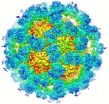(Press-News.org) ST. LOUIS, MO, March 21, 2012—Twenty million Americans get sick from norovirus each year according to data released last week by the Centers for Disease Control (CDC). Often called vomiting illness, it can spread rapidly on cruise ships, and in dormitories and hospitals. Recent data from the CDC shows deaths from gastrointestinal infections have more than doubled and have become a particular threat to the elderly. The virus is shed in the stool of the infected individual, has a short incubation period and can spread quickly if proper hand washing and other measures are neglected.
While researchers say that vaccines for intestinal infections are among the most difficult to develop, a recent discovery may provide the critical information needed for success. "Sometimes atomic structure gives us clues on how viruses work and how to make better vaccines," said Dr. Thomas Smith, principal investigator, at The Donald Danforth Plant Science Center whose recent article, Structural Basis for Broad Detection of Genogroup II Noroviruses by a Monoclonal Antibody That Binds to a Site Occluded in the Viral Particle, in the Journal of Virology was selected by the editors as an, "Article of Significant Interest, sighting the extreme norovirus flexibility suggested by these results may allow for broad antibody recognition, a finding of potential vaccine significance."
Smith was part of a team of scientists lead by Dr. Peter D. Kwong, National Institute of Allergy and Infectious Diseases, National Institutes of Health (NIH). Their research demonstrated that the virus has a structure unlike that of other viruses in that is has protein "lollipop" like structures that likely gives it more flexibility in attaching to cells. There are four genera of this virus family, the Caliciviruses, with the Sapoviruses and Noroviruses being the major cause of severe gastroenteritis in humans.
Dr. Smith and his colleagues discovered that because of the "lollipop" structure, antibodies against the norovirus may be able to bind to the more conserved underside of this floppy structure. This suggests that the extreme flexibility of the norovirus particle may allow for antibody recognition of protected surfaces that might otherwise be buried on intact particles.
This information will give researchers more insight on how to manipulate complex viruses as well as to design and develop better drugs to treat the maladies they cause. Rotovirus, a member of a different viral family but also causes severe gastro intestinal distress primarily in children, is being well controlled by the recent development of a vaccine.
INFORMATION:
About The Donald Danforth Plant Science Center
Founded in 1998, the Donald Danforth Plant Science Center is a not-for-profit research institute with a mission to improve the human condition through plant science. Research at the Danforth Center will feed the hungry and improve human health, preserve and renew the environment, and enhance the St. Louis region and Missouri as a world center for plant science. The Center's work is funded through competitive grants and contract revenue from many sources, including the National Institutes of Health, U.S. Department of Energy, National Science Foundation, U.S. Department of Agriculture, U.S. Agency for International Development, the Bill & Melinda Gates and Howard G. Buffett Foundations.
The Donald Danforth Plant Science Center invites you to visit its website, www.danforthcenter.org, featuring interactive information on the Center scientists, news, education outreach and "Roots & Shoots" blog to help keep visitors up to date on the Center's areas of research and programs.
Discovery offers insight into treating viral stomach flu
Lethal Norovirus has become the second leading cause of death from gastroenteritis
2012-03-22
ELSE PRESS RELEASES FROM THIS DATE:
UF researchers look for ways to make an emerging technology safe for environment
2012-03-22
GAINESVILLE, Fla. — The percentage of electronic waste occupying our landfills has grown at an alarming rate over the last decade, giving rise to concerns about the toxicity of components used in consumer electronics.
Researchers at the University of Florida are looking for ways to minimize environmental hazards associated with a material likely to play an increasingly important role in the manufacture of these goods in the future. The results of their most recent studies are published in the March 2012 issue of Nanotoxicology.
Carbon nanotubes are already being used ...
Genetic mutation found in familial chronic diarrhea syndrome
2012-03-22
HUNTSVILLE, Ala. -- When the intestines are not able to properly process our diet, a variety of disorders can develop, with chronic diarrhea as a common symptom. Chronic diarrhea can also be inherited, most commonly through conditions with genetic components such as irritable bowel syndrome. Researchers in Norway, India, and at the HudsonAlpha Institute for Biotechnology have identified one heritable DNA mutation that leads to chronic diarrhea and bowel inflammation.
Shawn Levy, Ph.D., faculty investigator at HudsonAlpha said, "Based on the effects seen from this one ...
Middle school teacher support lowers risk for early alcohol use
2012-03-22
SEATTLE – March 21, 2012: Anxiety, depression, stress and social support can predict early alcohol and illicit drug use in youth, according to a study from Carolyn McCarty, PhD, of Seattle Children's Research Institute, and researchers from the University of Washington and Seattle University. Middle school students from the sixth to the eighth grade who felt more emotional support from teachers reported a delay in alcohol and other illicit substance initiation. Those who reported higher levels of separation anxiety from their parents were also at decreased risk for early ...
Monarch butterflies down again this year as decline continues, says Texas A&M expert
2012-03-22
COLLEGE STATION, March 21, 2012 – Unlike their colorful wings, the future of Monarch butterflies may not be too bright and their numbers are expected to be alarmingly down again this year, says a Texas A&M University researcher.
Craig Wilson, a senior research associate in the Center for Mathematics and Science Education and a long-time butterfly enthusiast, says reports by the World Wildlife Fund, private donors and Mexico's Michoacan state show that Monarch numbers will be down almost 30 percent in 2012 as they make their annual trek from their breeding grounds in ...
International Logistics Solutions, an Offshore Group Company, Becomes Certified C-TPAT Trade Partner
2012-03-22
International Logistics Solutions (ILS) has recently been certified as a partner in The Customs-Trade Partnership against Terrorism (C-TPAT) program.
By participating in this important Customs and Border Protection Agency initiative, ILS will be making a vital contribution towards helping to secure the nation's borders, as well as ensuring the continued flow of international free trade.
As a C-TPAT partner, the role of International Logistics Solutions (ILS) is to make certain that appropriate security measures, based upon risk analysis and consistent with C-TPAT ...
Low socioeconomic status means worse health -- but not for everyone
2012-03-22
Poverty is bad for your health. Poor people are much more likely to have heart disease, stroke, and cancer than wealthy people, and have a lower life expectancy, too. Children who grow up poor are more likely to have health problems as adults.
But despite these depressing statistics, many children who grow up poor have good health. In a new article published in Perspectives on Psychological Science, a journal of the Association for Psychological Science, Edith Chen and Gregory E. Miller of the University of British Columbia suggest a possible reason: some children have ...
Parents of children with cancer distrust and fear online sources of health information, study shows
2012-03-22
BUFFALO, N.Y. -- Parents and adult caregivers of pediatric cancer patients prefer personal consultations with trusted health care providers over online sources for information about their child's illness, according to a University at Buffalo research study.
Despite the accessibility of online medical information, the UB study found that parents not only distrusted information found through the Internet, they often feared what types of information they might encounter.
"Respondents were telling us they were uncertain of the information online and that they were afraid ...
False killer whales use acoustic squint to target prey
2012-03-22
Hunting in the ocean's murky depths, vision is of little use, so toothed whales and dolphins (odontocetes) rely on echolocation to locate tasty morsels with incredible precision. Laura Kloepper from the University of Hawaii, USA, explains that odontocetes produce their distinctive echolocation clicks in nasal structures in the forehead and broadcast them through a fat-filled acoustic lens, called the melon. 'Studies by other people showed odontocetes have the ability to control the shape of the echolocation beam and it has always been assumed that they are using the melon ...
Getting in rhythm helps children grasp fractions, study finds
2012-03-22
Tapping out a beat may help children learn difficult fraction concepts, according to new findings due to be published in the journal Educational Studies in Mathematics. An innovative curriculum uses rhythm to teach fractions at a California school where students in a music-based program scored significantly higher on math tests than their peers who received regular instruction.
"Academic Music" is a hands-on curriculum that uses music notation, clapping, drumming and chanting to introduce third-grade students to fractions. The program, co-designed by San Francisco State ...
Prenatal exposure to combustion-related pollutants and anxiety, attention problems in young children
2012-03-22
NEW YORK ( March 22, 2012) - Mothers' exposure during pregnancy to a class of air pollutants called
polycyclic aromatic hydrocarbons (PAH) can lead to behavioral problems in their children. PAH are
released to air during incomplete combustion of fossil fuel such as diesel, gasoline, coal, and other
organic material.
The study is the first report of associations between child attentional and behavioral problems among school‐age children and two complementary measures of prenatal PAH exposure: monitored air concentrations of PAH and a PAH-specific biomarker of exposure ...
LAST 30 PRESS RELEASES:
Scientists show how to predict world’s deadly scorpion hotspots
ASU researchers to lead AAAS panel on water insecurity in the United States
ASU professor Anne Stone to present at AAAS Conference in Phoenix on ancient origins of modern disease
Proposals for exploring viruses and skin as the next experimental quantum frontiers share US$30,000 science award
ASU researchers showcase scalable tech solutions for older adults living alone with cognitive decline at AAAS 2026
Scientists identify smooth regional trends in fruit fly survival strategies
Antipathy toward snakes? Your parents likely talked you into that at an early age
Sylvester Cancer Tip Sheet for Feb. 2026
Online exposure to medical misinformation concentrated among older adults
Telehealth improves access to genetic services for adult survivors of childhood cancers
Outdated mortality benchmarks risk missing early signs of famine and delay recognizing mass starvation
Newly discovered bacterium converts carbon dioxide into chemicals using electricity
Flipping and reversing mini-proteins could improve disease treatment
Scientists reveal major hidden source of atmospheric nitrogen pollution in fragile lake basin
Biochar emerges as a powerful tool for soil carbon neutrality and climate mitigation
Tiny cell messengers show big promise for safer protein and gene delivery
AMS releases statement regarding the decision to rescind EPA’s 2009 Endangerment Finding
Parents’ alcohol and drug use influences their children’s consumption, research shows
Modular assembly of chiral nitrogen-bridged rings achieved by palladium-catalyzed diastereoselective and enantioselective cascade cyclization reactions
Promoting civic engagement
AMS Science Preview: Hurricane slowdown, school snow days
Deforestation in the Amazon raises the surface temperature by 3 °C during the dry season
Model more accurately maps the impact of frost on corn crops
How did humans develop sharp vision? Lab-grown retinas show likely answer
Sour grapes? Taste, experience of sour foods depends on individual consumer
At AAAS, professor Krystal Tsosie argues the future of science must be Indigenous-led
From the lab to the living room: Decoding Parkinson’s patients movements in the real world
Research advances in porous materials, as highlighted in the 2025 Nobel Prize in Chemistry
Sally C. Morton, executive vice president of ASU Knowledge Enterprise, presents a bold and practical framework for moving research from discovery to real-world impact
Biochemical parameters in patients with diabetic nephropathy versus individuals with diabetes alone, non-diabetic nephropathy, and healthy controls
[Press-News.org] Discovery offers insight into treating viral stomach fluLethal Norovirus has become the second leading cause of death from gastroenteritis


